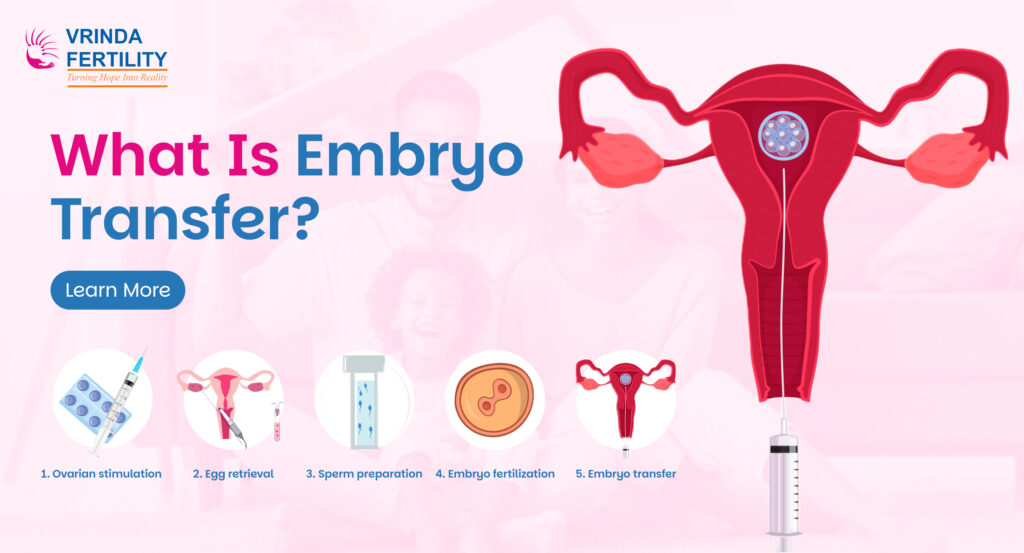Embryo transfer is the final, pivotal step in the in vitro fertilization (IVF) process where fertilized embryos are placed into the uterus with the hope of achieving pregnancy. It’s a delicate and time-sensitive procedure that bridges science and human emotion. Whether you’re undergoing fertility treatment or simply researching options, understanding embryo transfer is essential to making informed, empowered choices.
What Happens During Embryo Transfer?
The embryo transfer procedure is generally quick, painless, and requires no anesthesia. Here’s what to expect:
- Embryo Selection: Embryologists evaluate embryo quality under a microscope. Embryos may be transferred at the cleavage stage (Day 3) or blastocyst stage (Day 5).
- Catheter Placement: A thin, flexible catheter loaded with the selected embryo(s) is gently inserted through the cervix into the uterus.
- Ultrasound Guidance: Using abdominal ultrasound, the doctor ensures accurate placement of the embryo in the optimal uterine location.
- Rest and Observation: A brief resting period may follow, though extended bed rest is generally not recommended.
Fresh vs Frozen Embryo Transfer
Fresh Transfer
- Embryos are transferred in the same cycle as egg retrieval.
- Often occurs 3–5 days post-fertilization.
Frozen Embryo Transfer (FET)
- Embryos are cryopreserved and transferred in a future cycle.
- Offers greater flexibility and may allow better endometrial preparation.
FET is widely used today due to higher implantation potential and more controlled hormone environments.
Factors That Influence Embryo Transfer Success
To boost IVF success rates, several factors must align:
- Embryo Quality: Higher-grade embryos are more likely to implant.
- Endometrial Receptivity: The uterine lining must be at its optimal thickness (typically 7–9 mm).
- Timing: Transfers are synchronized with hormonal cues for maximum receptivity.
- Technique: Gentle catheter placement and ultrasound precision improve outcomes.
- Lifestyle Choices: Nutrition, stress levels, sleep, and avoiding toxins all matter.
After Embryo Transfer: What to Expect
- Mild cramping or bloating may occur.
- Continue prescribed progesterone or hormone support.
- Avoid strenuous activity but maintain light movement.
- A pregnancy test is typically scheduled 10–14 days after transfer.
Tips to Support Embryo Implantation
- Stay hydrated and maintain a balanced, fertility-friendly diet.
- Prioritize sleep to regulate hormone levels.
- Limit caffeine and eliminate smoking/alcohol.
- Practice relaxation—stress impacts uterine blood flow.
- Follow medication protocols strictly and consult your doctor before taking anything new.
Choosing the Right Fertility Center Matters
For the best results, trust an IVF clinic with:
- High success rates in both fresh and frozen embryo transfers
- Advanced embryo grading techniques (e.g. time-lapse imaging)
- Personalized care and transparency
If you’re seeking fertility support, Vrinda Fertility offers expert IVF care, experienced embryologists, and patient-first treatment plans. Stay connected via Facebook and Instagram for real stories, updates, and support.
Conclusion: A Step Toward New Beginnings
Embryo transfer is more than just a medical procedure—it’s a moment filled with hope, science, and human resilience. Knowing what to expect empowers you to take part actively in your fertility journey. Choose your fertility clinic wisely, care for your body, and lean on your support system.
For compassionate care and expert IVF services, visit Vrinda Fertility. Stay inspired and informed by following them on Facebook andInstagram.
Frequently Asked Questions (FAQ)
The egg retrieval process usually takes 20 to 30 minutes. Including check-in, preparation, and recovery time, you can expect to spend about 2 to 3 hours at the clinic.
No, the procedure is performed under mild sedation or anesthesia, so you won’t feel any pain during it. Some women experience mild cramping or bloating afterward, but it typically goes away within a day or two.
Preparation includes fasting the night before, staying well-hydrated the day before, and following your clinic’s medication and trigger shot instructions. Comfortable clothing and arranging transportation home are also important.
The trigger shot is a final hormone injection given 34–36 hours before egg retrieval. It helps the eggs complete their maturation process and ensures they are ready to be collected at the right time.
On average, 10 to 15 eggs are retrieved during one IVF cycle. This number may vary depending on your age, ovarian reserve, and how your body responds to stimulation medications.
Egg retrieval is a safe and routine procedure. It does not cause long-term damage to the ovaries. Minor side effects like temporary cramping or slight spotting are normal and resolve quickly.
Common side effects include light spotting, bloating, mild cramping, and fatigue. These symptoms usually disappear within 24 to 48 hours. Drinking fluids and resting help speed up recovery.
If you’re not going through a fresh embryo transfer, your next period typically arrives 10 to 14 days after the egg retrieval procedure.
Yes. Since the procedure involves sedation, you will not be able to drive afterward. You must arrange for a family member or friend to take you home safely.
You’ll usually be informed about the number of eggs collected shortly after the procedure, once you wake up in the recovery room. Details about egg maturity and fertilization come within the next 24–48 hours.



